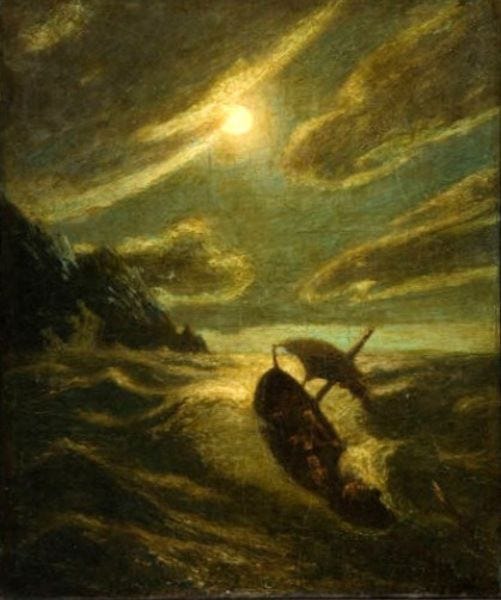Last month around this time when the moon was full, our nights were filled with howling. Almost every night we hear the mournful cries of coyotes in the fields behind our house, along with ecstatic barking, yipping, chortling–-as if they were celebrating a kill, or worshipping the moon, or engaged in some wild orgy.
Or perhaps they were merely giving voice to the irresistible life force pumping through their blood and brains and hearts, a force of nature too wild and fierce to hold back.
The sound, terrifying and exhilarating at the same time, echoed long in my mind afterwards, like ripples of water moving away to the edge of consciousness and reverberating back again. Like something heard long ago deep in my bones, from an evolutionary or primal past.
They say we humans carry in our genes the imprint of life-forms going back to when the first cells emerged on earth. Deep in our blood, our bones, our very atoms, lays some faint memory of our ancient beginnings. Phylogenists call it our “vast evolutionary tree.”
If we go back even further, traces of that time when the morning stars first sang together may still be felt when we look out on the night sky. We are the stuff of stars, after all, so say astrophysicists.
Carl Jung envisioned our Collective Unconscious as a reservoir lying deep within our psyches containing our evolutionary memories. While they lay below consciousness, they break through in dreams and myths and fairy tales, in primitive urges, the call of the wild, in our more-than-human yearnings.
Sometimes we feel this wildness rising within when witnessing powerful displays of nature: thunderstorms booming across the land, waterfalls careening over cliffs, huge waves crashing against rocks, hurricanes lashing at trees, lightening forking across a dark sky, earthquakes heaving beneath our feet. It frightens and excites—creating both the desire to escape and to embrace that primordial power.
One wild howl elicits another—the urge to howl back, to voice our own wild yearnings—to sing or dance, or paint or play, or grab words from the air and fling them onto paper.
I heard that howl and answered back one night on anchor watch in Pago Pago. A hurricane was blowing a few miles off Samoa and we were set to ride it out if it blew into the bay.
I stood at the bow of La Gitana, hanging onto the staysail as the deck lurched beneath my feet like a wild stallion while the surging waves rose and fell and the chain from the anchor rooted deep in the mud below grew slack or tight.
Overhead a torrent of clouds crashed against a full moon, sometimes swallowing it whole, then washing away streaming moonlight. All around me the night raged while the anchor held tight, and I held tight, the terror and exhilaration pumping through my blood and brain. The wild urge to let go and be carried away by the night was fierce. Later I tried to capture what it felt like.
Here’s what I wrote:
NIGHT HOWL
(Anchor watch in Pago Pago, Samoa)
Alone beneath a wild and ragged night I watch,
moonlight and clouds wind-tangled across the sky.
Suddenly I am loosened, lifted, flung far–-
fingers raking stars, mouth howling moon, mind mooning time
my heart-beat
riddles the universe.
Alone beneath a wild and ragged night I stand
astonished,
gaping into the maw of some vast mirror.
It’s close to capturing what I felt, but the last two lines trouble me. “Gaping” and “maw” keeps the visceral effect I’m looking for, capturing the sense of trance-like awe and terror. But mirror moves it away into something more philosophical or intellectual.
I’m tempted to stop with the line “my heartbeat riddles the universe.” That captures the physicality of my wildly beating heart breaking out of my body to become the heart-beat of the universe. And it also hints at the mystery of human heartbeat itself being a riddle, the riddle of the universe, that the evolution of the universe over eons led to the creation of a human being, whose heart—its essential being—is the ability to reflect back upon the universe, to take it all in.
Human consciousness is the mirror through which the universe sees and knows itself, and through which we see and know ourselves—the fullness of being, our primal past and present standing face to face.
That’s a lot to howl about.





Thank you for sharing the wild!
What if the last word was terror instead of mirror? Too much?